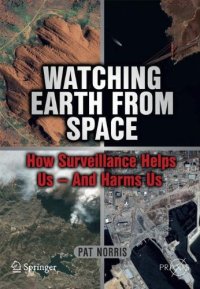
Ebook: Watching Earth from Space: How Surveillance Helps Us -- and Harms Us
Author: Pat Norris (auth.)
- Genre: Technique // Aerospace Equipment
- Tags: Remote Sensing/Photogrammetry, Popular Science in Nature and Environment, Measurement Science and Instrumentation, Aerospace Technology and Astronautics
- Series: Springer Praxis Books - Space Exploration
- Year: 2010
- Publisher: Praxis
- Edition: 1
- Language: English
- pdf
- Are satellites a threat to individual privacy? - How bad is climate change and global warming? - Why can we not find Osama bin Laden? - Does the world have enough fresh water? Watching Earth from Space gives you the answers to these and many other burning questions of the day. This is the story of how our planet is being monitored by hundreds of space-borne instruments for both military and peaceful reasons. It highlights the technical challenges of those instruments and describes the agencies that gather useful information from them. But as well as all the essential monitoring performed by satellites - such as mapping natural or man-made disasters, agricultural performances, weather, and climate change to name a few - there is a growing swell of public opinion that they are being used by governments to erode personal privacy and freedom. This book looks at the possible conflict between public good and market forces, and the future development of new systems to deal with new needs.
Our planet is constantly monitored by hundreds of space-borne instruments. This book describes the technology of those instruments and the sciences that provide useful information from them. It also discusses the political implications of space-borne monitoring. From the moment satellites were launched into orbit their ability to see what was happening on a global scale was appreciated — and feared. This well researched book strives to answer such diverse questions as: Are satellites really a threat to individual privacy? How bad, really, is climate change and global warming? Why can’t we find Osama bin Laden? Does the world have enough fresh water? The military side of the story is linked to the big security issues that we face, such as terrorism and civil wars. The civilian side of the story involves numerous successful collaborations in weather forecasting, navigation, communications, and other such ''peaceful'' uses of satellite surveillance. How the world handles the knowledge gained from these Earth watchers will be critical in the years to come, and Norris skillfully leads us through the issues and possible paths we can take.